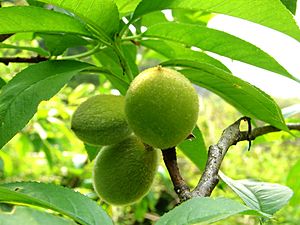Prunus davidiana facts for kids
Prunus davidiana (also known as Amygdalus davidiana, Persica davidiana, or Prunus persica var. davidiana) is a type of plant in the Prunus genus, which belongs to the Rosaceae family. You might know it better as David's peach or the Chinese wild peach. This tree originally comes from China. It likes to grow in forests, bushy areas, on mountain slopes, and even in open fields. You can find it at high altitudes, from about 800 to 3200 meters (2,600 to 10,500 feet) above sea level. This peach tree is special because it can handle cold weather and is strong against many common problems that affect other peach trees. Scientists often study it to help make cultivated peaches even better.
Quick facts for kids Prunus davidiana |
|
|---|---|
 |
|
| Conservation status | |
| Scientific classification |
|
| Kingdom: | Plantae |
| Clade: | Tracheophytes |
| Clade: | Angiosperms |
| Clade: | Eudicots |
| Clade: | Rosids |
| Order: | Rosales |
| Family: | Rosaceae |
| Genus: | Prunus |
| Subgenus: | P. subg. Cerasus |
| Species: |
P. davidiana
|
| Binomial name | |
| Prunus davidiana Carr.
|
|
| Script error: The function "autoWithCaption" does not exist. | |
| Synonyms | |
|
|
Script error: No such module "Check for conflicting parameters".
Contents
What Does David's Peach Look Like?
The David's peach is a tree that loses its leaves every year. It grows straight up.
Size and Shape
This tree can grow quite tall and wide. It can reach up to 9 meters (30 feet) in both height and width.
Branches and Bark
Young branches are flexible, grow upwards, and feel smooth. The bark on the tree is smooth and has a dark purplish-red color.
Leaves
The leaves are dark green and smooth. They are shaped like long, narrow ovals, usually 5 to 12 centimeters (2 to 5 inches) long. The tip of each leaf is long and pointy, and the edges are finely toothed. The leaf stems have small glands on them.
Flowers and Fruit
The flowers bloom in late winter or early spring, often in February.
Flowers
The flowers are about 2.5 centimeters (1 inch) wide. They can be white, light pink, or a deeper rosy color. The small stalks that hold the flowers are very short.
Fruit
The fruit of the David's peach is yellow and has a fuzzy skin. It is edible, meaning you can eat it.
Growing David's Peach Trees
This tree is very tough and can survive cold weather. It grows best when it gets lots of sunshine.
Uses in China
In China, people often grow David's peach trees for their beauty. The fruit is eaten, but it is not considered as tasty or valuable as other peaches.
Rootstocks for Peaches
Around the world, farmers use David's peach trees in a special way. They use them as "rootstocks" for other peach trees. This means they grow the David's peach roots and trunk, then attach a different type of peach tree onto it. This helps the new peach tree grow stronger and resist diseases.
Different Types of David's Peach
There are a couple of known types, or varieties, of David's peach:
- P. davidiana var. alba: This type has white flowers.
- P. davidiana var. rubra: This type has deep rosy-colored flowers.
Where Did the Name Come From?
The name Prunus is an old Latin word for plum trees. The second part of the name, davidiana, honors a person named L'Abbé Armand David (1826-1900). He was a missionary who also collected many plants from China.
 | Tommie Smith |
 | Simone Manuel |
 | Shani Davis |
 | Simone Biles |
 | Alice Coachman |


